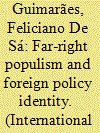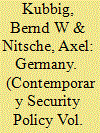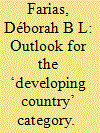| Srl | Item |
| 1 |
ID:
180829


|
|
|
|
|
| Summary/Abstract |
In the last two decades, far-right populists have formed governments all over the world. However, systematic analyses on how far-right leaders recreate their countries' foreign policy identity are still underdeveloped. In this article, we analyse how far-right populist leaders use their conservative identity-set to align with other right-wing governments and how they use the same conservative repertoire to deal with ideological rivals. More precisely, we argue that these leaders tend to overemphasize a deep conservative identity-set towards other far-right populist governments, something we call ‘thick conservative identity’. This profoundly conservative identity-set is composed of three national role conceptions: anti-globalism, nationalism and anti-foe. However, they do not repeat this identity-set towards ideological rivals, preferring to use a more nuanced and contradictory one, something we call ‘thin conservative identity’. The trigger of such difference is the anticipated mutual expectation of conservatism between Ego and Alter, in which Ego mimics Alter's deep conservatism. We use Jair Bolsonaro's alignment with Donald Trump and Bolsonaro's relationship with China as illustrative cases. We use the main concepts of role theory to understand both how conservative alignments are created and how far-right governments deal with ideological rivals.
|
|
|
|
|
|
|
|
|
|
|
|
|
|
|
|
| 2 |
ID:
072804


|
|
|
|
|
| Publication |
2005.
|
| Summary/Abstract |
From 1998 until it ended in 2005, the Social Democratic-Green coalition government rejected an explicit position on the necessity of a global or regional European shield, signalling scepticism towards such plans. At the same time the Schröder/Fischer cabinet, after an intense debate, was in favour of developing the tripartite MEADS system for the protection of soldiers deployed in out-of-area activities. The major missile defence-related issues examined in this article suggest that the changing identity of Germany as a trading power is in the final analysis the most credible explanation for these choices. In accordance with its greater stress on being a politically sovereign/more assertive country, the Federal Republic of Germany mutated during the Schröder/Fischer era from being a reluctant exporter of security to being a selective one. With this important exception, the missile defence-related decisions made in the Schröder/Fischer era do not support the conclusion that missile defence in general has become a stable and important element of the self-understanding of Germany and of its foreign policy.
|
|
|
|
|
|
|
|
|
|
|
|
|
|
|
|
| 3 |
ID:
165073


|
|
|
|
|
| Summary/Abstract |
In the 2016 edition of its World Development Indicators (WDI), the World Bank introduced an important change in the way it categorises countries: it explicitly stated the intention to eliminate the distinction of countries as ‘developing’ and ‘developed’. This decision represents the first time one of the world’s most powerful and influential international organisation has overtly decided to move away from this fuzzy-yet-ubiquitous terminology for categorising countries (and not proposing to replace the division). This paper takes this shift to discuss country groupings based on development levels, particularly the ‘developed’/’developing’ dichotomy, focusing on the latter term. The paper argues for a paradoxical scenario, wherein the label ‘developing’ will increasingly become analytically useless while concurrently retaining – or even strengthening – its power in the context of foreign policy strategies. The analysis details the motives behind this paradox and provides a reasoning for when and why the term’s usage is likely to be weakened or strengthened. Simply put, the ‘developed’/’developing’ dichotomy is weakening in its analytical capacity, mostly due to the increasing heterogeneity among countries under the ‘developing’ label and concurrent porosity of ‘boundaries’ between the two categories, while showing little sign of being phased as a term for self-identification.
|
|
|
|
|
|
|
|
|
|
|
|
|
|
|
|